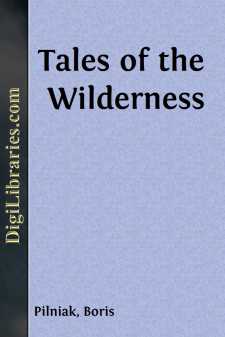Categories
- Antiques & Collectibles 13
- Architecture 36
- Art 48
- Bibles 22
- Biography & Autobiography 813
- Body, Mind & Spirit 142
- Business & Economics 28
- Children's Books 14
- Children's Fiction 11
- Computers 4
- Cooking 94
- Crafts & Hobbies 4
- Drama 346
- Education 46
- Family & Relationships 57
- Fiction 11829
- Games 19
- Gardening 17
- Health & Fitness 34
- History 1377
- House & Home 1
- Humor 147
- Juvenile Fiction 1873
- Juvenile Nonfiction 202
- Language Arts & Disciplines 88
- Law 16
- Literary Collections 686
- Literary Criticism 179
- Mathematics 13
- Medical 41
- Music 40
- Nature 179
- Non-Classifiable 1768
- Performing Arts 7
- Periodicals 1453
- Philosophy 64
- Photography 2
- Poetry 896
- Political Science 203
- Psychology 42
- Reference 154
- Religion 513
- Science 126
- Self-Help 84
- Social Science 81
- Sports & Recreation 34
- Study Aids 3
- Technology & Engineering 59
- Transportation 23
- Travel 463
- True Crime 29
Tales of the Wilderness
by: Boris Pilniak
Description:
Excerpt
RUSSIAN FICTION SINCE CHEKHOV
The English reading public knows next to nothing of contemporary Russian Literature. In the great age of the Russian Realistic Novel, which begins with Turgeniev and finishes with Chekhov, the English reader is tolerably at home. But what came after the death of Chekhov is still unknown or, what is worse, misrepresented. Second and third- rate writers, like Merezhkovsky, Andreyev, and Artsybashev, have found their way into England and are still supposed to be the best Russian twentieth century fiction can offer. The names of really significant writers, like Remizov and Andrey Bely, have not even been heard of. This state of affairs makes it necessary, in introducing a contemporary Russian writer to the English public, to give at least a few indications of his place in the general picture of modern Russian Literature.
The date of Chekhov's death (1904) may be taken to mark the end of a long and glorious period of literary achievement. It is conveniently near the dividing line of two centuries, and it coincides rather exactly with the moment when Russian Literature definitely ceased to be dominated by Realism and the Novel. In the two or three years that followed the death of Chekhov Russian Literature underwent a complete and drastic transformation. The principal feature of the new literature became the decisive preponderance of Poetry over Prose and of Manner over Matter—a state of things exactly opposite to that which prevailed during what we may conveniently call the Victorian age. Poetry in contemporary Russian Literature is not only of greater intrinsic merit than prose, but almost all the prose there is has to such an extent been permeated with the methods and standards of poetry that in the more extreme cases it is almost impossible to tell whether what is printed as prose is really prose or verse.
Contemporary Russian Poetry is a vigorous organic growth. It is a self-contained movement developing along logically consistent lines. It has produced much that is of the very first order. The poetry of Theodore Sologub, of Innocent Annensky, [Footnote: The reader will notice the quotations from Annensky in the first story of this volume.] of Vyacheslav Ivanov, and of Alexander Blok, is to our best understanding of that perennial quality that will last. They have been followed by younger poets, more debatable and more debated, many of them intensely and daringly original, but all of them firmly planted in the living tradition of yesterday. They learn from their elders and teach their juniors—the true touchstone of an organic and vigorous movement. What is perhaps still more significant—the level of minor poetry is extraordinarily high, and every verse-producer is, in varying degrees, a conscious and efficient craftsman.
The case with prose is very different. The old nineteenth century realistic tradition is dead. It died, practically, very soon after Chekhov. It has produced a certain amount of good, even excellent, work within these last twenty years, but this work is disconnected, sterile of influence, and more or less belated; at the best it has the doubtful privilege of at once becoming classical and above the age....


